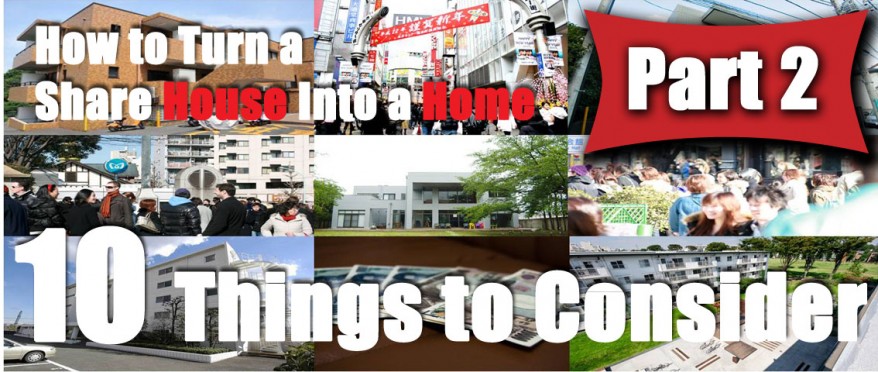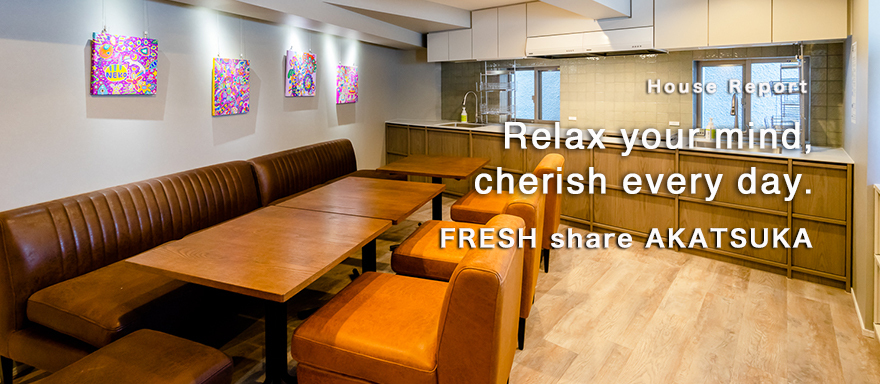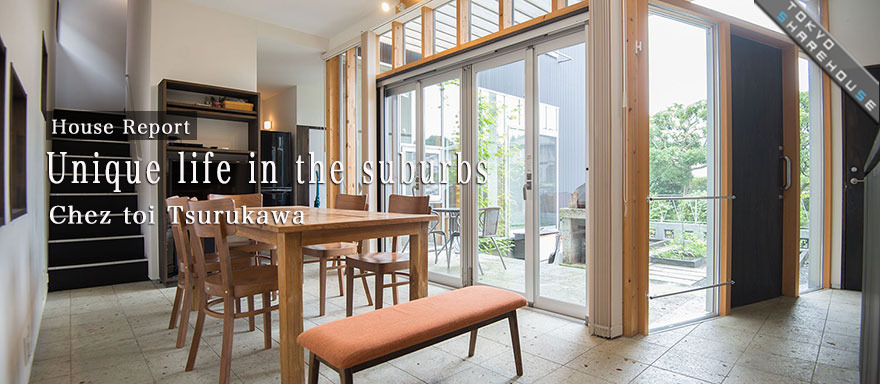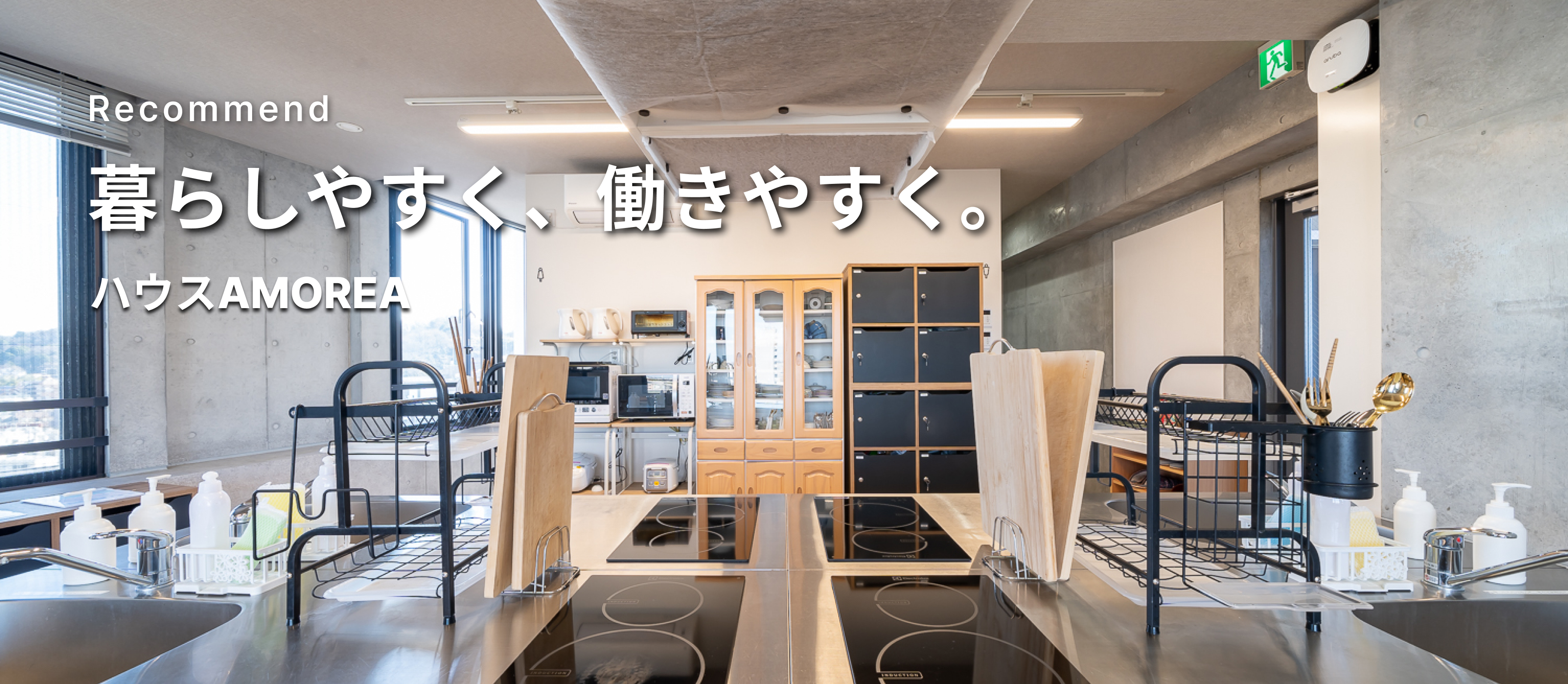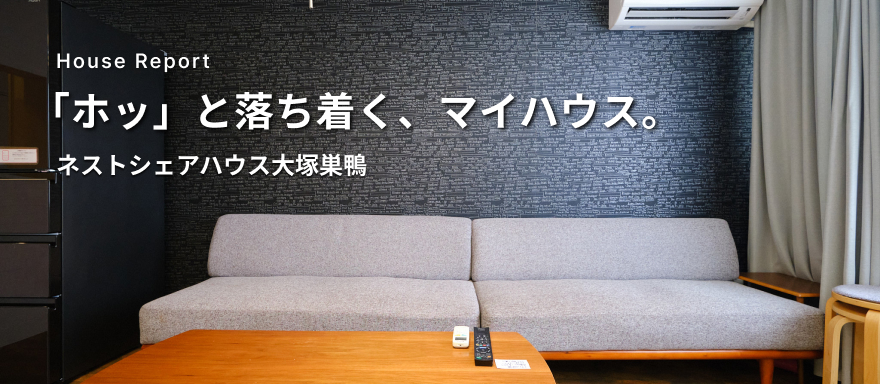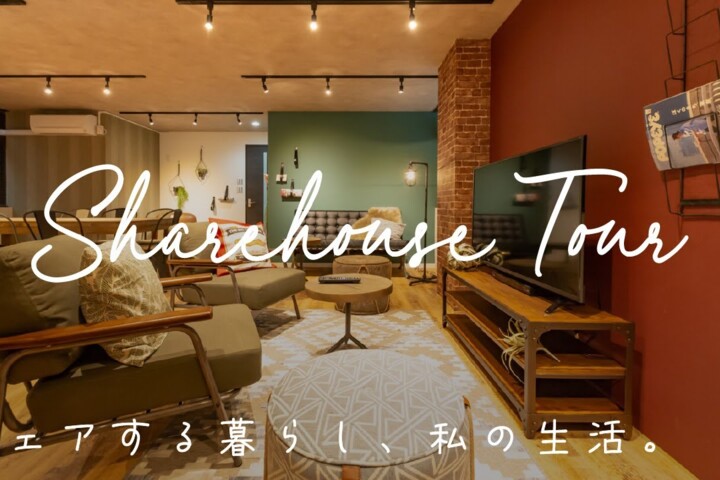2. Location
Location! Location! Location! What place you choose to live in will greatly impact how you spend your time while in Japan. It may sound strange, but one thing to consider first is where you are in life.
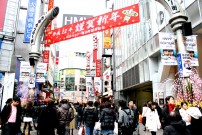 For example, if you’re a student, did you recently start school? Do plan to attend your current university for one or two semesters, or a few academic years? From personal experience, I know the anxiety that can come from having to find a place to move by a particular deadline while also juggling the worries of work and school. Strapped for cash, I reluctantly settled on a very inexpensive apartment, but it was also located very far from the school. While the long commute offers time to read, or even take a nap if the mood strikes you, it can also take away from time better spent focused on your studies, or even just hanging out and enjoying the sights of Japan. Because share houses are fairly affordable even close to Tokyo, you’ll be at an advantage. So choose your location wisely in terms of distance from places you need to frequent often such as work or school.
For example, if you’re a student, did you recently start school? Do plan to attend your current university for one or two semesters, or a few academic years? From personal experience, I know the anxiety that can come from having to find a place to move by a particular deadline while also juggling the worries of work and school. Strapped for cash, I reluctantly settled on a very inexpensive apartment, but it was also located very far from the school. While the long commute offers time to read, or even take a nap if the mood strikes you, it can also take away from time better spent focused on your studies, or even just hanging out and enjoying the sights of Japan. Because share houses are fairly affordable even close to Tokyo, you’ll be at an advantage. So choose your location wisely in terms of distance from places you need to frequent often such as work or school.
For flexibility, you should also consider the train lines available to you in the location you choose. Perhaps there are rapid trains that stop at your station to help you get to work or school faster. You may also end up on a train line that’s known for nightmarish rush hour traffic or hold-ups from accidents. Of course, this is not only for work or school, but also when you want to go out and have fun as well. If there are any places you like to go, how easy will it be for you to go there? When living in an apartment, I was lucky enough to have the Shonan Shinjuku Line run through my train station, making it easy to reach places like Ikebukuro, Shibuya, and Shinjuku in one shot. If I were living one station over, going to hang out with friends would have been a lot more complicated.
But enough about the trains, the train isn’t where you’ll be living. When you choose a place to live, you need to know about the place itself. Are there grocery stores nearby? How far away from the station will you be located? Will there be a 711 or Lawson nearby when you’re craving a late night snack? Convenience is key when looking for a place to stay. If, for example, you choose a place further out toward the countryside, you could find yourself living a 20 minute walk away from any and everything, and without a bike things would get rough pretty fast. Having variety within close proximity can
know about the place itself. Are there grocery stores nearby? How far away from the station will you be located? Will there be a 711 or Lawson nearby when you’re craving a late night snack? Convenience is key when looking for a place to stay. If, for example, you choose a place further out toward the countryside, you could find yourself living a 20 minute walk away from any and everything, and without a bike things would get rough pretty fast. Having variety within close proximity can

You may also want a place to relax as well. Just because you’re going out doesn’t mean it has to be a train ride away. There may be good cafes or restaurants nearby to eat together with friends or share mates. If you prefer the outdoors, maybe you’d like a share house with a park nearby. Whether it’s going out to eat, shopping, outdoor recreation, or even places for sight-seeing, there’s something for everyone, it’s just a matter of finding a good location that offers the right combination of accessible places to suit your needs. also be helpful too. With multiple stores selling similar goods in the area, it also gives you the opportunity to fish around for the best deals on the things you need.
3. Price
While location is a very big deciding factor in choosing a share house, if you can’t afford it, you’re not going to get anywhere. As mentioned earlier, the closer you get to Tokyo, the higher you can expect the cost of rent to be. But if you’re looking for a share house, there’s a better chance of finding a place that’s not quite so expensive. If for example you’re looking for a 1DK (bedroom + dining / kitchen) apartment in the heart of Tokyo, you can expect prices between 70,000 Yen and 200,000 Yen. Unfortunately, there’s still the matter of deposit money, key money, insurance, and the possibility of certain furnishings such as a Television or washing machine not being available.
 I’m sure many readers prefer to have their own space when possible, and will opt for a private room when moving into a share house. However, if you’re really looking to make friends and don’t mind sharing a room, be sure to check if dormitory rooms are available. Even with more expensive share houses, the dormitory rooms are significantly cheaper, sometimes even half the cost of a private room. On occasion there are also special savings reducing the cost of moving in, or even discounts for moving in for over a certain period of time, but you may have to inquire about such discounts when selecting a share house. Furthermore, for those planning to teach English and wouldn’t mind a little practice at home, this is another great possibility to save money. It’s not uncommon to receive generous discounts for giving a weekly English lesson to residents in the share house. While you won’t be paid in cash, your wallet will thank you for the savings as your cost of living goes down.This is where you have a chance to save moving into a share house. Even in the thick of Tokyo, you can find places as cheap as 30000 Yen, with a few on the higher end topping out around 90,000 Yen. The average price is around 50,000 to 60,000 Yen, and even then there are still chances to save on your way in, and for the duration of your stay.
I’m sure many readers prefer to have their own space when possible, and will opt for a private room when moving into a share house. However, if you’re really looking to make friends and don’t mind sharing a room, be sure to check if dormitory rooms are available. Even with more expensive share houses, the dormitory rooms are significantly cheaper, sometimes even half the cost of a private room. On occasion there are also special savings reducing the cost of moving in, or even discounts for moving in for over a certain period of time, but you may have to inquire about such discounts when selecting a share house. Furthermore, for those planning to teach English and wouldn’t mind a little practice at home, this is another great possibility to save money. It’s not uncommon to receive generous discounts for giving a weekly English lesson to residents in the share house. While you won’t be paid in cash, your wallet will thank you for the savings as your cost of living goes down.This is where you have a chance to save moving into a share house. Even in the thick of Tokyo, you can find places as cheap as 30000 Yen, with a few on the higher end topping out around 90,000 Yen. The average price is around 50,000 to 60,000 Yen, and even then there are still chances to save on your way in, and for the duration of your stay.
Another big obstacle to moving in, namely key money, deposit, and insurance, is something you won’t have to worry about. First and foremost, key money is rarely, if ever, requested from a share house, so you can throw that one out the window. The deposit can vary depending on the share house. It’s not uncommon to find share houses that don’t require a deposit, but should there be one, you can expect the cost to be between 10000 Yen and 30000 Yen. There are a few cases where the cost is equal to a month’s rent like a traditional apartment, but those are generally far and few between. As for the insurance? It went out the window with the key money.
So, just remember, the closer you get to Tokyo, the more you should put aside for your budget. However, there are chances to save such as dormitory rooms, special discounts (including giving English lessons), and only a deposit to worry about with your first month’s rent. I bet moving in to a share house is sounding simpler as we go along, but there’s still more to think about. You’ve got a location in mind, and you have your budget, but now it’s time to start thinking more about what’s inside the share house itself.
4. Accommodations
So you’ve found a good location, and the price is right. Now it’s time to take a closer look at the inside of the house. Depending on the share house, you can find a lot of different amenities. Whether because it’s an upscale share house, or the amenities simply cater to a given theme of the house, there are a lot of possibilities. However, it’s always good to start with the basics.
First there’s, of course, your room. Depending on your life style you may, or may not spend a lot of time in your room, but this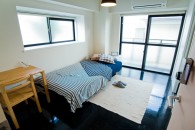 is where you make your home within a home. If you can’t be comfortable here, it’s going to be that much harder to be comfortable anywhere else. If you’re moving into a private room, the essentials for your room typically include your bed, a desk, and air conditioner. Some rooms also include a TV, so if your room comes with one, you don’t have to worry about missing your favorite shows. Mini-refrigerators are also common for private rooms. While it won’t hold a great deal of food, if there’s a grocery store near the house, there’s less pressure to stock up on foods so it won’t be overstuffed.
is where you make your home within a home. If you can’t be comfortable here, it’s going to be that much harder to be comfortable anywhere else. If you’re moving into a private room, the essentials for your room typically include your bed, a desk, and air conditioner. Some rooms also include a TV, so if your room comes with one, you don’t have to worry about missing your favorite shows. Mini-refrigerators are also common for private rooms. While it won’t hold a great deal of food, if there’s a grocery store near the house, there’s less pressure to stock up on foods so it won’t be overstuffed.
In the case of dormitory rooms, it’s not uncommon to have a loft-style bed with lots of space under it to place your desk and 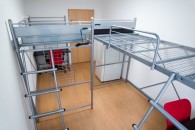 other personal belongings. There will also most likely be a curtain or something to block off your side of the room to give you a sense of privacy. Regardless of which room type you pick, however, the bed can either be a mattress or sometimes a futon set placed on a bed frame. It’s good to know which your room will have, as you’ll need to put a little effort into keeping a futon clean if that’s what your room is furnished with.
other personal belongings. There will also most likely be a curtain or something to block off your side of the room to give you a sense of privacy. Regardless of which room type you pick, however, the bed can either be a mattress or sometimes a futon set placed on a bed frame. It’s good to know which your room will have, as you’ll need to put a little effort into keeping a futon clean if that’s what your room is furnished with.
Another obvious point to consider is how large the room is. You can look on a website, see the specs for a room, and think to yourself “ya, a room that size is no problem,” but actually visiting and seeing the room for yourself can sometimes be an eye opener. Depending on what you move in with, you’ll need room for clothes, toiletries, it all depends on you. Don’t forget your suitcases have to be put away somewhere as well. The last thing you want is to take into account all of your belongings and forget about the container they came in.
While not a deal breaker for some, be sure to take a close look at the showers, washing machines, and in some cases dryers 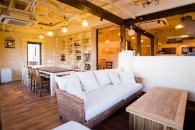 available at the share house you pick. While I can’t say dryers are common in share houses, the reason I mention these three is that they can sometimes require a fee for use. If there is a fee, showers typically cost 100 JPY per use, giving you 15 to 20 minutes of hot and cold water. Washing machines and dryers can vary, but never cost more than 200 JPY per use.
available at the share house you pick. While I can’t say dryers are common in share houses, the reason I mention these three is that they can sometimes require a fee for use. If there is a fee, showers typically cost 100 JPY per use, giving you 15 to 20 minutes of hot and cold water. Washing machines and dryers can vary, but never cost more than 200 JPY per use.
Last, but certainly not least, is the kitchen and lounge area. There are a handful of share houses that don’t have a lounge area, but you can generally expect at least one area where residents hang out together, sometimes connected directly to the kitchen. Depending on the number of people and the type of share house, the lounge can be small and simple, large and extravagant, or there could even be multiple lounge areas in the house. As for the kitchen, you can always count on the essentials being there, once in a while finding professional grade cookware. This doesn’t mean the kitchen will have everything, so if there’s a particular cooking utensil you like to use, or perhaps you have a favorite mug, it won’t hurt to ask if they’ll let you bring dishes or cooking utensils to the share house.
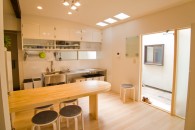
There are times where one may feel pressured to simply find a place and move in right away, but I highly suggest you take yourtime, if only to actually visit the share house and take a look around. If it’s available be sure take a look at the room your planning to move into, even if it’s not written on the website, check if the showers, washing machines, and dryers require a fee, and take a moment to at least take a look at the lounge, you might see a few future share mates there before you leave.
5. Atmosphere
After taking a look around the share house, there’s perhaps one last question you should ask yourself: how did it feel being in the share house? When looking for a share house myself, I visited several. While hard to explain, each share house had a different air about them, which greatly affected my decision on where to live. Perhaps it was the lighting in the rooms, the surrounding neighborhood, or perhaps even the residents I met when taking a tour of the houses, something about each house said “this is a good place for you to stay” or “you may not have such a fun time staying here.”
This is not to say that some share houses are not worth investigating. Depending on one’s character, or what one likes to do in their free time, some places may simply be more appropriate than others. Referring back to the importance of location, a person who’s not very social and enjoys peace and quiet may not enjoy the atmosphere of a share house in Shinjuku. On the other hand, those who are more outgoing may feel of sense of boredom nestled in a quiet residential area. Looking at the house itself, perhaps you’re satisfied with a spacious room to yourself, but the rest of the house doesn’t quite feel cozy enough. Whatever the case may be, take a good look around the area the share house is located, and take a good look at the inside of the share house. There’s more to comfort than a good bed and a nice living room. If you find the atmosphere to your disliking, it can ruin your share house experience.
/Author: Paul

